
Local search has a lot of power for firms that want to target certain areas. 46% of all Google searches are looking for local information.
So, if your business isn’t optimized for local search, you could miss out on potential buyers ready to shop in your region. In summary, local SEO is essential if you want your business to stay relevant.
Here is a local SEO guide with many practical tips to help you improve your business performance in local searches.
What is Local SEO?
Local SEO is optimizing a website for local search to improve traffic, leads, and brand exposure. Finding local keywords, enhancing a business’s Google My Business profile, and creating NAP citations are all primary tasks related to local SEO.
Who Needs Local SEO?
Any business with a physical location where clients can be greeted or serve a specific local area qualifies for local SEO.
Local SEO should be used by local brick-and-mortar companies such as restaurants, bars, laundromats, physicians’ offices, legal offices, and grocery stores.
Additionally, service-area businesses like plumbers, construction workers, locksmiths, and other such professions who travel to their customers) are eligible to use local SEO and would benefit similarly.
Why Do You Need to Do Local SEO?
Local SEO makes your business stand out and helps with online lead generation and more foot traffic to your location.
You should expect a high conversion rate because these leads come from people specifically looking for your company’s products or services.
Local searches are on the rise, with four out of five consumers now using search engines to get local information and 72% visiting a physical store due to information found in search results.
Local SEO can also help you sway people’s opinions in your favor. The more people know about your business before they come, the more trustworthy you are.
Local SEO Optimization Tips
1. Google My Business
Google My Business is an essential aspect of local SEO since Google prefers to share content that it can trust and verify.
Google My Business is their tool to help your business satisfy Google’s standards. If Google successfully verifies that your business is legitimate, it provides you with a coveted sidebar position in Google’s local search. You don’t just do it for the sake of SEO.
You can improve the experience for potential customers by having reviews and keeping your contact information and operation hours up to date. Because of the changes in consumer buying behavior and corporate operations due to recent events, consumers need to discover more up-to-date information.
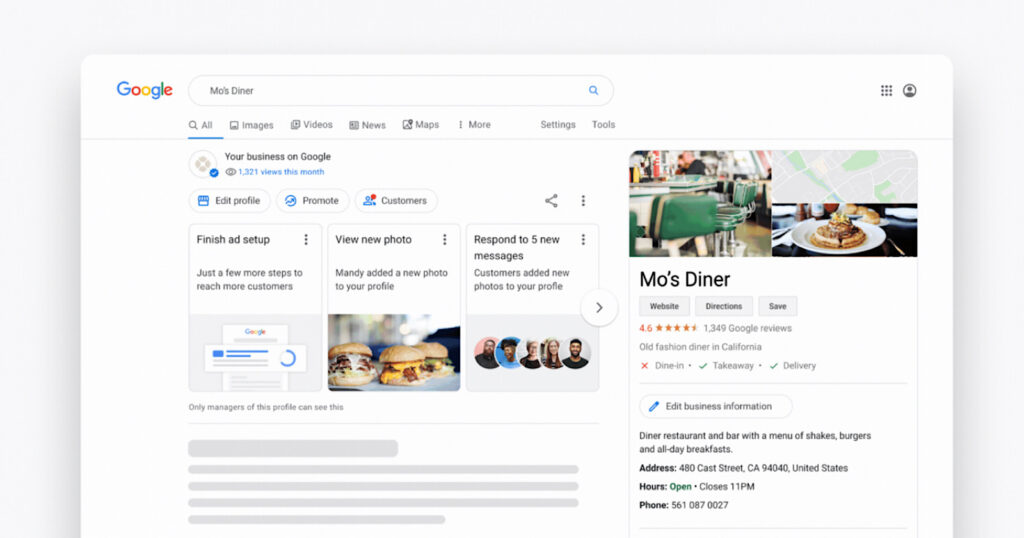
Here are some steps to create a Google My Business listing.
- Enter your business name
- Insert your address
- Point to your exact location on the map
- Select a category
- Put in your phone number and website address
- Verify your listing
Steps for Bing Places Listing Creation
- Select business type
- Enter your essential information (Name, Address, Website)
- Select a business category
- Add social profile links
- Insert photo
2. Consistent NAP (Name, Address, Phone Number)
You must make it simple for people to find you and for search engines to find you. Incorporate your NAP (name, address, and phone number) on your site and other online listings to accomplish this. This should be included on your site as crawlable HTML.
You should avoid making the usual mistake of placing the NAP within a picture; unlike HTML text, images cannot be crawled or indexed by search engines.
Make sure your business NAP is consistent across the internet; any discrepancies spoil your online authority and rankings.
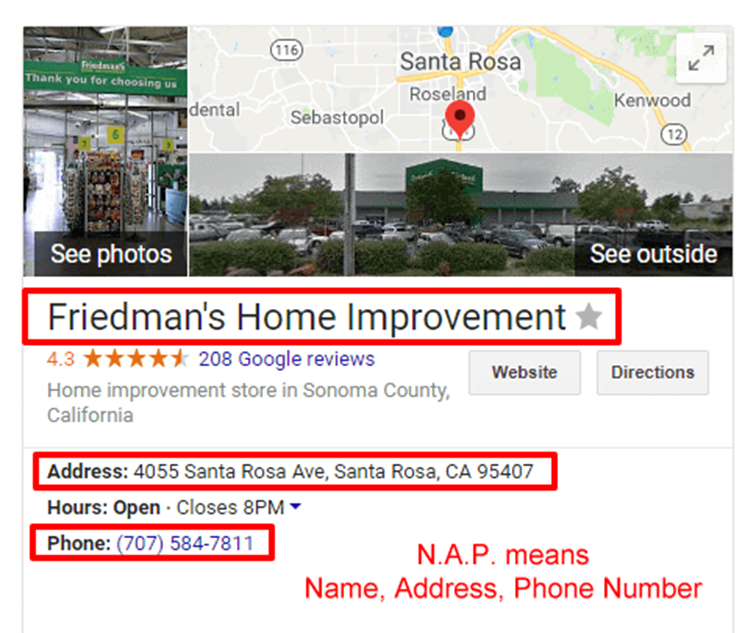
3. Optimize the Online Directories and Citations
Check to see if your citations are consistent and complete across the web. Misspellings, abbreviations, the absence of a suite number, or an inaccurate phone number can all be frustrating.
If Google cannot determine which information about your organization is accurate, it may not appear in search results. Also, make a point of deleting any duplicate listings you see.
4. Local SEO Audit
SEO is a process that is both ongoing and intuitive. So, instead of stopping there or simply making changes and seeing what sticks, it’s a good idea to do a thorough audit to determine where your website stands and what needs improvement to meet your objectives.
The following are examples of what a local SEO audit might entail:
- How does your Google My Business listing appear on the search engine results pages (SERPs)? Is all of the data correct?
- Is it possible for a search engine to find your website? Is there anything wrong with it that might make indexing difficult?
- Is your website optimized for all on-page SEO aspects that aid ranking?
- In the top business directories, are all of your citations correct?
- How does your website compare to those of your competitors? Do you have any holes that need to be filled? In terms of inbound links, design, content, and positioning, how do you compare?
- What is the status of your website performance?
5. Keyword Research
One basic but important thing you must do in local SEO is conduct keyword research.
Before you optimize your business or implement these ranking strategies, you must choose which search terms you want to rank for.
There are a few other reasons why keyword research is necessary:
- To design landing pages focused on keywords and phrases that can be found via a search engine.
- To gain a better understanding of search behavior and, in general, to better understand your target audience.
- To grow into similar markets and/or refocus your products or services.
- To learn more about how to attract your ideal clientele.
Here are some ways to do keyword research.
a. Yelp Suggest
It’s one of the popular directories, but you can use it for your local SEO keyword research.
You need to type the words that one would use to search for your business. Now, analyze the fetched results, and check out the keywords people use to optimize their business for local searches. You might also find some new relevant keywords that you might miss.
b. Google Suggest
Google has a solution for everything; for your keyword research as well. Just type in the primary keywords of your business, and see the various relevant results in the suggestion.
Make sure you insert the location to get the more relevant suggestions because general keyword suggestions won’t help you with your local SEO strategy.
c. Google Keyword Planner
Google Keyword Planner provides data on search volume for specific geographical locations.
This feature is helpful if you already have a list of keywords and want to pick the finest of them.
However, if you want to explore with fresh keywords, use the “Start with a Website” tool.
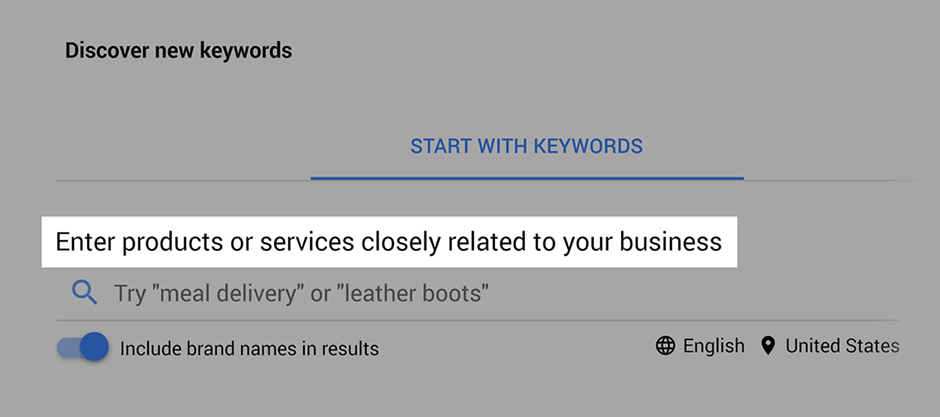
Simply type in the following URL for one of your competitors’ homepages.
And based on the terms on that page, Google recommends several keywords.
6. On-page SEO
Here are some on-page SEO actionable tips for your local SEO.
Optimize Your Homepage
Your homepage should clearly state who you are, where you are located, and what you do. Make it simple for Google to comprehend these aspects of your company.
This information should be clearly stated in your page title tag, the header tag, and the meta description.
If you’re using WordPress to create your website, you can quickly change the page title tag in the left menu under Settings > General. The Yoast SEO plugin can also help you load your page metadata.
Write Perfect Meta Title and Description
There has been much discussion about whether page title tags and meta descriptions are helpful. Whether or not they still have a significant indirect impact on rankings.
Your page’s CTR depends on your title and description, and a higher CTR promotes higher rankings. If you want to optimize for local SEO, ensure your page title tags include the name of the city you wish to target. Include the city’s name in your page title tags and the product or service you provide.
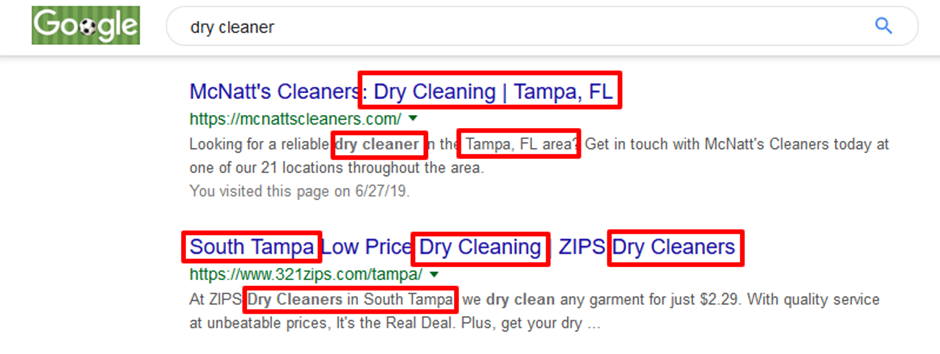
Create a Page for Every Location
Stop attempting to consolidate; it is ineffective for both SEO and local SEO. Each of your product/service offers must have its own page to apply product/service schema to them.
This is an SEO best practice in general since it helps search engines understand your sitemap and helps your product/service pages rank for that specific offering. It also opens the door to specific schema applications.
Create a page for each location if you have more than one. If your Houston location is on the same page as your Austin and Dallas locations, how do you expect it to rank in search results? Exactly. It is not going to happen. So, instead of trying to cram all of your locations/services pages into one page, create a separate page for each.
It’ll require a little more effort, but it’ll allow them more room to establish their area and be found in the right area when searched.
Utilize schema
To optimize your website for local SEO, you should at the very least use local business schema, or structured data markup, on every web page. Without this, getting into the famed Google Local Pack is nearly impossible. Local schema is supplemental code that you may add to your website’s pages to help search engines better understand who you are, what you do, where you’re located, and how you could be relevant to individuals looking for your type of products or services.
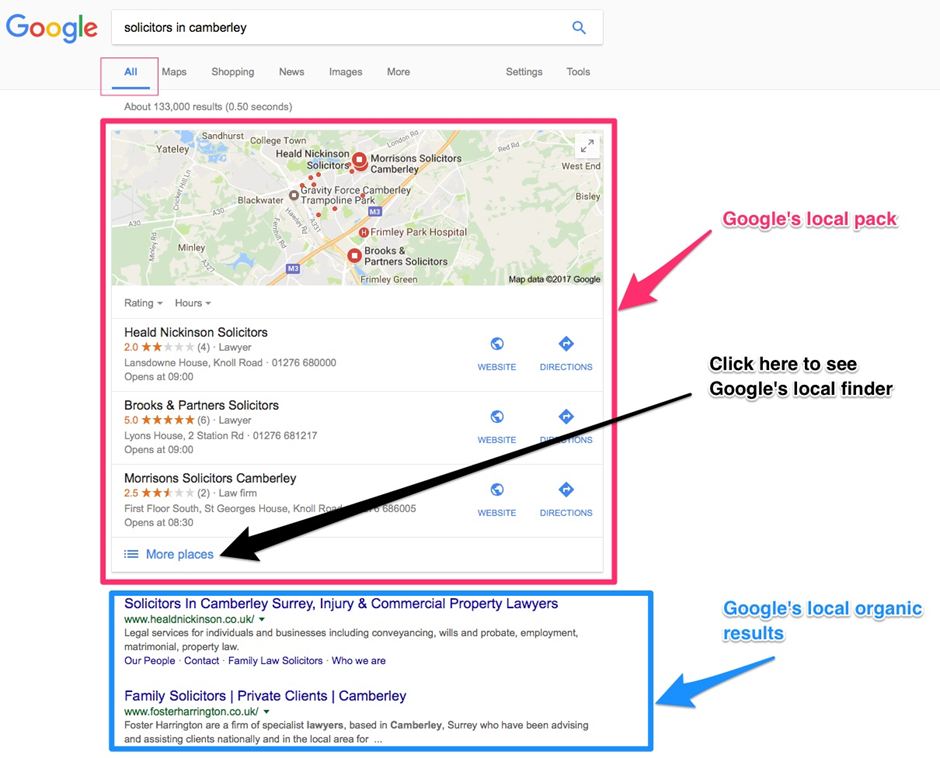
When you add product and service schema to your website, it concentrates on the specifics of each product or service. Schema is, once again, communicating with search engine crawlers in their own language. Make things easier for them. So, for the best local search results, it’s advised to use the schema to better convey your business and location to the crawlers.
If you’re not sure if your site has a schema, you can use Google’s Structured Data Testing Tool to test a URL and see how various schemas on your site are broken down.
Improve Interlinking
When a site links to other URLs on the same site, this is known as internal linking. Internal links are beneficial since they assist Google in better understanding and ranking your website.
You may tell Google which pages of your site are significant and what they’re about by offering Google links to follow along with descriptive anchor text. Internal links also benefit the user’s experience and may help increase engagement.
So, do the interlinking on your site, and consider the location-based keywords as anchors where they make sense.
7. Curate Local Content
Google is becoming more intelligent, meaning content creators may now write for people rather than search engines. While writing about general issues will appeal to a broad audience, narrowing your focus and writing about local or industry news to appeal to a specialized audience is frequently more important.
To gain authority in your niche, promote local industry gatherings, news, employees, and other instructive information on your blog. Consider creating top-of-funnel material that isn’t just about your company’s products.
If you’re a local security company seeking to reach new businesses in the region, build a helpful resource to assist them in getting acquainted with your community.
A map of local service providers or a city-wide events calendar could be helpful to your persona and offer highly relevant local signals.
8. Local Link Building
Local link building, unlike traditional SEO, requires a lot more involvement in the local community.
You’ll need links from local websites to improve the locational part of your company’s website, page, or hub.
More prominent brands will undoubtedly require assistance in this area, as local community websites exist to support local indigenous enterprises rather than international corporations.
Building local links is time-consuming, but the benefits are well worth it since it is one of the most effective strategies to improve local SEO ranks.
Local links are an excellent approach to boost your presence in all aspects of local search.
Here are some ways to do the local building.
Local Sponsorships
You can leverage links from a sponsorship page to generate leads for a specific offer that is highly relevant to the sponsored group, organization, or team’s audience.
Local sports businesses, for example, may sponsor local youth sports teams and provide team-specific discounts.
Local Scholarships
Scholarships are still a great way to get people to link to you. However, it’s critical to approach the issue with a positive mindset and not only seek out connections.
While scholarships can help you connect with people, it shouldn’t be your only purpose when applying for them.
Consider providing local scholarships to students who are likely to become clients. You might be amazed at how effectively this generates goodwill, brand recognition, and, more importantly, local links.
Local Events
Local government websites occasionally get engaged in marketing local events, which may be a fantastic way to gain connections while generating leads for your company. Look for event websites with a history of linking back to sponsors and partners.
So, throw some events to bring your community together while also earning connections from local websites.
Local Newspapers, Forums, and Communities
While this local link-building technique necessitates a little more manual outreach, reaching out to local newspapers, forums, or online communities is a terrific way to promote your brand in your town while potentially earning some high-quality local backlinks.
You can connect your content or product with the publication of these local newspapers, forums, or communities once you’ve determined if they publish articles or postings related to your target keyword or phrase.
If you can adequately integrate your content and offer with their newspaper, you will demonstrate to them that you can benefit their readers, increasing your chances of earning a backlink.
Local Business Directories
Large web directories, such as the Better Business Bureau or White pages, are ideal for showcasing your company’s NAP information and getting a backlink from a high-authority domain; but these directories aren’t always customized to local search results. Instead, search for local web directories in your area that residents use when looking for particular businesses or services.
Local Bloggers and Influencers
Consider approaching local bloggers or influencers for a feature on your company if you know of any in your area. This form of local link-building strategy can assist in boosting your business’s visibility in your town and, as a result, attract more potential clients because they are likely to have a decent following.
Unlinked Mentions
Several times, your company may have already been mentioned by other companies or publications. However, because many site owners neglect to link back to your site, you will not gain from these references.
Google Alerts and Mention are helpful tools for following your brand mentions across social media channels. Using such tools, you can keep track of all the buzz surrounding your business.
Simply contact the company/owner who has mentioned your brand and ask them to provide a link. Voila! Local backlinks.
Local link building is an ongoing process. You won’t be able to develop hundreds of local links overnight, but it’s an activity worth pursuing because it can provide a competitive advantage.
Stick with it, make new contacts, and evaluate your progress regularly.
9. Local SEO Ranking Factors
Google doesn’t randomly pick any websites and show them to the searchers. There is always logic and some factors considered when ranking websites for a search. Here are some prominent local SEO ranking factors.
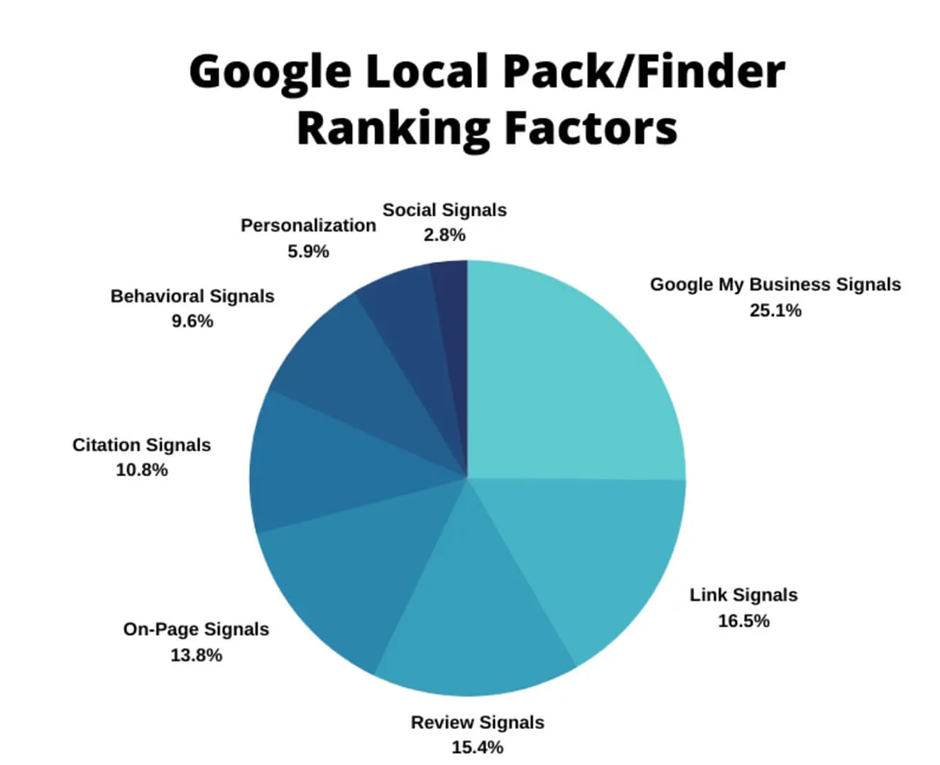
GMB
Google My Business is a free feature created by Google to connect consumers with local companies via Google Maps. It is arguably one of the most crucial local SEO ranking factors.
Creating your Google My Business listing correctly is critical to having your business discovered by both Google and potential clients. Because Google My Business is one of the first things customers see when searching for a company on Google, it’s critical to have your business listed, verified, and controlled there.
Search algorithms analyze and decode where and how your business is shown to consumers in your area using GMB signals such as proximity, contact information, categories, and updated content.
Online Reviews
Before making a purchase, customers always check all accessible information on a company. Positive customer reviews help to establish your company as dependable, trustworthy, and legitimate.
Positive online reviews not only influence potential clients’ decision-making processes but will also factor into local search ranking.
Businesses that receive good online feedback and evaluations will see their rankings rise. The total amount, regularity, diversity, and quality of reviews generated for the business are all factors in local SEO ranking signals.
When a company receives numerous genuine glowing reviews for its services, Google compiles this as a good sign. And, because Google prioritizes the user, businesses with positive evaluations will appear higher in local search results.
Online Citations
Today’s online directories and citations are the modern-day equivalents of the Yellow Pages. Citations help disseminate consistent information about a company on the internet and obtain local backlinks from reputable and authoritative sites.
Searchers use directories and citations to locate items and services and their contact information. Search engines use citations to verify critical information about a company.
NAP consistency will be a crucial component in local SEO ranking factors. Ensure your company name, address, and phone number are consistent throughout all directories and citations.
Behavioral Signals
Google’s algorithm employs behavioral signals to decide the order in which local search results are ranked.
Your audience members’ actions to demonstrate how they interact and engage with local business listings and websites are known as behavioral signals.
Click-Through-Rate, Mobile Clicks to Calls, and Social Media Check-ins are the most popular user signals.
All of these characteristics are analyzed by search engines to identify which businesses are the most relevant and receive the most valued attention from users.
To improve the user experience for local searchers, a thorough local SEO campaign will involve attentively tracking behavioral indications and making adjustments.
Backlink Profile
Backlinks are essential for gaining online authority. For a favorable influence on their site, local businesses should seek out links from local, relevant, and authoritative websites. Obtaining high-quality backlinks might be difficult; it’s vital to remember that quality trumps quantity when it comes to other websites connecting to yours.
Receiving backlinks to your website from other reputable websites is an integral part of achieving first-page rankings in search results. The quantity of connecting domains, the relevancy of the links, the linking domain authority, and the anchor text used to link to your website are all local SEO ranking variables related to backlinks.
On-page Signals
Many on-page characteristics are considered when your website is analyzed for local rankings. The usage of relevant keywords is the first step. To figure out where your site belongs, search engines will hunt for keywords that are highly relevant and effectively arranged.
Relevancy is crucial for local SEO since the appropriate keywords might help your site rank in specific areas relevant to your sector.
On-page ranking considerations are aided by crucial facts such as name, address, and phone number (NAP) on pages. Google uses this information to establish critical proximity details for your rankings.
Mobile-Friendliness
The mobile-friendliness of your website is another on-page ranking criterion for local SEO. For local SERPs and user experience, making your website accessible and speedy on mobile devices is critical.
People are continuously looking for nearby items and services; by optimizing your pages for local search, you can make it simpler for them to find you.
10. Local SEO Reporting
Getting caught up in the techniques is easy, but it’s crucial to remember why you’re here.
Because you engaged in local SEO to generate more leads and business, the first measure you should consider is that. Go to GMB Insights to get a decent picture of how things are going with your business profile’s performance.
Have you noticed an increase in the number of phone calls you’re receiving? More visitors to your website? More foot traffic through directions?
All of these point to the fact that you’re doing a better job of being noticed in local Google searches and converting visitors.
Finally, check the bottom line, i.e., sales.
How to Do Local SEO Reporting?
Use free tools like Google Analytics to check the website performance and Google My Business Insights to see if you’re getting found more through local search and how that’s affecting calls and directions requests to report on the impact of your local SEO strategy.
Once you have your data, you can keep track of it in a spreadsheet and compare how things improve month to month.
11. Advanced Local SEO Tips
Thumbtack Suggest
It is a great way to explore local keywords. This tool can find some prominent keywords for your landing pages. You can use this with your other keyword research tools to strengthen your keyword research and secure better local search rankings.
Incorporate Google Map on Your About Us Page
This is a wonderful approach to making it clear to Google that you’re in a specific location. All you have to do is look up your company on Google Maps. Then, press the small dropdown menu in the top left corner of the screen. Then select “Share or embed map.”
This will generate an embedded code for you. Finally, include the map on your website’s contact or directions page.
Use Location-Based Keywords in the First Fold
When users come to your webpage, they want to know whether you serve their area or not ASAP. So, if you placed a generic heading, your visitors might return to search results to visit a site that serves the intended region.
So, a location-focused heading assures users that you serve their area and encourages visitors to explore the site further and make the final purchase.
Write Meta Description for Local Searchers
Don’t keyword stuff your meta description. Instead, write something that interests your nearby customers. You can consider the ads rankings on your target keywords for the meta description ideas.
People choose their best copies to show for their ads, and those best copies can be excellent references for your landing page meta descriptions.
Helpful Local SEO Tools
Whitespark Local Citation Finder
Whitespark provides local listing management, recommends where your business should be listed, analyses your competition, and builds and monitors your citation growth for improved local search rankings.
From an SEO standpoint, this desktop tool searches websites’ links, pictures, CSS, scripts, and apps. Screaming Frog offers a free version that analyses up to 500 URLs and a commercial version that analyses an infinite number of URLs for $200 per year.
Moz Local is less priced than most of its competitors, and it will verify your company listing on Google and Facebook and spread it across the search ecosystem.
Moz Local will also work with data aggregators to help promote listings, ensuring your company gets noticed.
BuzzStream helps you generate local backlinks by analyzing influencers, tracking conversations, and delivering reporting insights into your outreach initiatives, team performance, and link placements.
BrightLocal is a comprehensive SEO tool package designed exclusively for the marketing needs of local businesses. The tool can help you monitor and manage reviews on local sites, examine neighboring competitors, and understand your local search success.
Client access and white-labeled reporting are also available through BrightLocal.
Final Words:
By now, you must know everything about the local SEO and how you have to proceed with it to improve your local search rankings.
So, start doing local SEO today! If you are too busy to do it or not competent for local SEO, we are a result-driven local SEO agency that can help you achieve exceptional business results in local searches.
You can even reach us for a free consultation for your business SEO! Good Luck!
